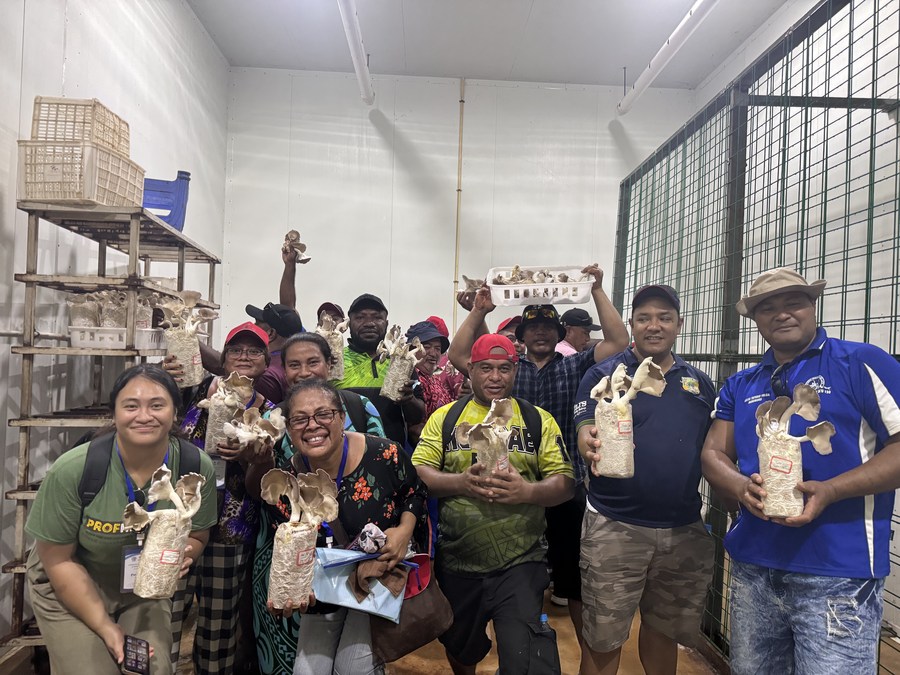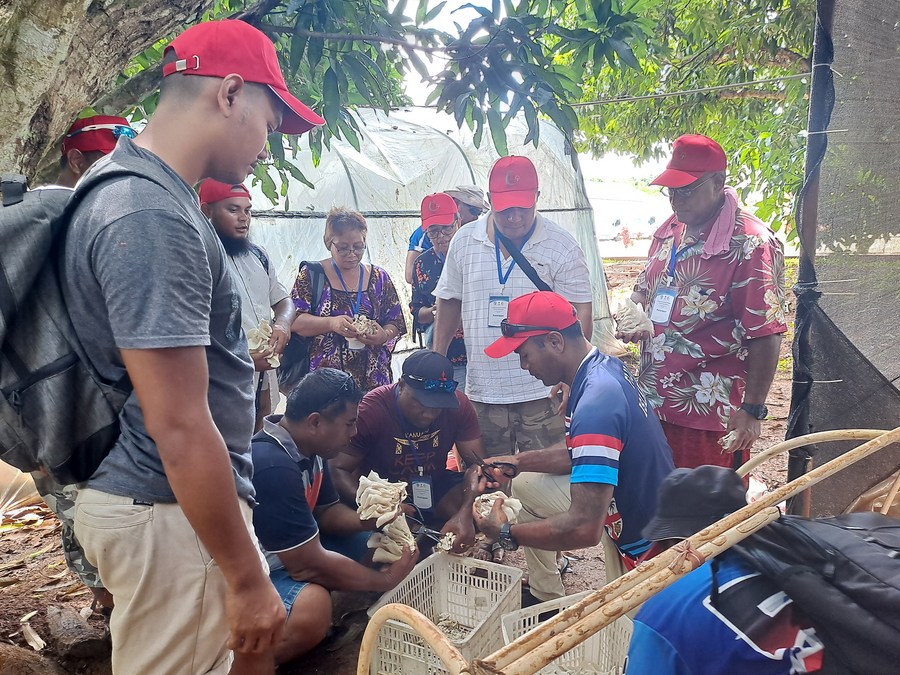
Participants of a training course on Juncao technology for Pacific Island countries pose for a photo with mushrooms cultivated using Juncao ingredients in Nadi, Fiji, Feb. 28, 2024. (China-Fiji Juncao Technology Demonstration Center/Handout via Xinhua)
Fiji used to run out of livestock forage in the dry season and its fungi products were fully dependent on imports. But after China introduced the Juncao technology as part of its free assistance, things have been changed.
SUVA, March 7 (Xinhua) -- Sant Kumar, a former agriculture staff who has been involved in farming for years, is encouraging Fijians to plant Juncao grass along the banks of rivers and streams to avoid soil loss due to heavy rain and flooding.
"I was losing my land due to flooding, so I decided to visit the Juncao Technology Demonstration Center in Nadi to seek advice. That is when I was introduced to Juncao grass," 86-year-old Kumar said.
He can attest to the wonders of Juncao grass as it now grows steadily on the riverbank close to his farm when he started planting it in September of last year.
Kumar is not the only one who'd fallen for Juncao, a hybrid grass developed by Chinese scientists after decades of research and cultivation.
Its leaves, stems and roots are useful for different kinds of ecological management, such as soil erosion control, desertification prevention and saline-alkali soil management.
It can also be used for mushroom farming, or as livestock forage and poultry feed.
Daniel Mataroa, who visited Kumar's farm, was amazed by the lush green, tall and succulent grass.
Mataroa is from the Cook Islands and has just finished a seven-day training course on Juncao technology for Pacific Island countries, during which he visited several demonstration sites in Nadi, including Kumar's farm, also known as Bula Agro Juncao Technology Demonstration Base.
On the first day of the training, Mataroa and other participants practiced planting mushrooms outdoors, and on the last day, they harvested the mushrooms planted by themselves.
"It's easy to learn, even the elderly or children can get involved in the mushroom farming to make money for families," said Mataroa, who was filled with joy of the harvest.
Fiji used to run out of livestock forage in the dry season and its fungi products were fully dependent on imports. But after China introduced the Juncao technology as part of its free assistance, things have been changed.

Participants of a training course on Juncao technology for Pacific Island countries harvest mushrooms they have cultivated using Juncao ingredients in Nadi, Fiji, Feb. 28, 2024. (China-Fiji Juncao Technology Demonstration Center/Handout via Xinhua)
With its tall stem, wide adaptability, fast growth and high crude protein content, Juncao has become a favorite livestock feed in Fiji, said Lin Xingsheng, team leader of the China-Fiji Juncao Technology Demonstration Center based in Nadi.
"Juncao has become a magic grass that is helping the local population get rid of poverty and live better lives," Lin said.
The training course was facilitated by experts from the Ministry of Agriculture and Waterways of Fiji, the China-Pacific Island Countries Juncao Technology Demonstration Center, China's Fujian Agriculture and Forestry University and other relevant organizations.
A total of 35 participants from 11 Pacific countries, including Papua New Guinea, Micronesia, Tonga, the Cook Islands, Samoa and Nauru, attended the training.
After a week-long study, field trips and practice, participants got a deeper knowledge on the Juncao technology and industry.
Timothy Ukiii, from Papua New Guinea (PNG), has been promoting the development of Juncao technology in his country since 2000. He told Xinhua that the yield of giant Juncao grass planted in PNG has set a world record of 854 tonnes per hectare a year.
Samoan researcher Saouila Melissa Tolovaa said the Juncao Technology will surely assist her island home through various means. She looks forward to introducing the production method of edible fungi to Samoa. She also hopes more and more Samoans could increase their income and improve their lives by developing Juncao industry.
"It is indeed a tool that will alleviate poverty and create a sustainable environment for everyone, " said Fijian agriculture official Tekini Nakidakida.
Since China's Juncao technology was introduced in 2014, around 2,400 participants have been trained, with more than 2,000 hectares of Juncao grass planted in Fiji, according to Nakidakida.




 A single purchase
A single purchase









